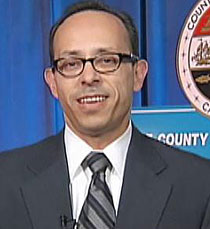Rescuing youthful identities
August 14, 2014

L.A. County is working hard to repair the finances of foster kids whose credit has been abused by adults.
Minors are ineligible for credit cards and car loans in California. Yet there they were—the names and Social Security numbers of more than 100 Los Angeles County foster children on credit reports dating back years.
The discovery, part of a 2010 pilot survey on identity theft in the foster care system, was a wake-up call, recalls Rigoberto Reyes, chief of investigations for the county Department of Consumer Affairs, which helped conduct the survey.
Some of the most vulnerable children in the county were being exploited so duplicitous adults could obtain apartments, vehicles, jobs, cell phones, gym memberships, health care, even mortgages and bail money.
“In one case, a prostitute had gotten hold of the foster kid’s information and was using the kid’s name every time she was arrested,” Reyes says. “To clear it, we had to get the kid a letter from the Department of Justice’s identity theft registry.”
The study, launched in the wake of a 2006 state law aimed at curbing identity theft in the foster care system, has since grown in Los Angeles County into a protection effort unmatched anywhere else in the state.
Now, with a number of legal and procedural kinks worked out of the system, Consumer Affairs has formally teamed up with the county Department of Children and Family Services to add routine credit checks to the list of services the county performs for its foster children, scouring credit databases for children’s names and clearing them as needed.
“Identity theft is rampant when it comes to foster children,” says Sasha Stern, an attorney with the L.A-based Alliance for Children’s Rights, which provides free legal services to children in out-of-home care. “They move so much, and their personal information is transferred so many times that they’re just more vulnerable. So what the county is doing is great.”
Working through a secured web site with the credit bureau Experian, the two county departments this year have begun routinely checking and clearing the credit records of every foster child over 16 in the county system, quietly troubleshooting one of the most common—and pernicious—obstacles to the children as they age out of the system and attempt to start lives as independent adults. By November, the county also will begin working with the two remaining major credit bureaus, Equifax and TransUnion.
“Imagine trying to rent an apartment, or buy a used car, if you’ve been stuck with bad credit,” Reyes says. “And now imagine trying to do that if you’re a foster kid, dealing with all the worries foster kids have when they’re being emancipated.”
“Often these kids don’t find out there has been a fraud until they’re denied a student loan or a car loan,” adds DCFS Division Chief Harvey Kawasaki. “Or until an employment agency does a credit check on them as a prospective employee, and then decides not to hire them.”
Although California passed a law in 2006 aimed at clearing foster kids’ credit records, implementation has been slow because of procedural and funding woes. Most counties still do little more than crosscheck the names of their foster children with credit databases, leaving the children themselves to rectify any problems.
But L.A. County has its own in-house consumer affairs staff, as well as about half of the foster children in California. That, Reyes says, is why L.A. was chosen for the 2010 pilot, which checked the records of about 2,110 foster children.
In the last four years, Reyes says, the county has checked the credit of 8,126 foster children, finding that about 10 percent of them had open accounts under their names. That’s significantly higher than the prevalence of identity theft among adults in the general population, which is about 7 percent, according to a 2012 federal study.
“It’s not a lot of kids, but those who do have problems have multiple, multiple problems,” Reyes says.
The fraudulent accounts seemed more likely to be opened by relatives or acquaintances of the children than by their foster families, Reyes says, and most involved credit cards, utilities or medical care. “For example,” he says, “we had one where the sister delivered a baby in the emergency room and used the foster kid’s ID because she didn’t have insurance, and our kid got hit for the bill.”
Some cases also point to lax quality control among lenders. One recent survey of names, for instance, turned up more than 50 credit card accounts that had been opened at one major bank under foster kids’ identities, presumably with social security numbers that would have identified them as minors.
So far, no fraud has been prosecuted through the program. This is partly because the checks until now have involved thousands of names at a time, with an emphasis on clearing up the credit records, as opposed to punishing wrongdoers. But abuses are expected to get more scrutiny as caseloads lessen.
Under the formalized system underway this summer, the names and Social Security numbers of each foster youth will be compared twice with the credit bureaus’ records—once right after the children turn 16, and again, shortly before they turn 18. Consumer Affairs will then clear up any problems.
“About 175 of our foster kids turn 16 every month,” Reyes says. “So even assuming that 10 percent have problems, that’s fairly manageable.”
Even so, he warns, separating fraud from human error isn’t easy. Sometimes the record is as simple as confusing a son’s name with a father’s, or clearing up a credit bureau’s mistake.
In the case in which a $217,000 mortgage was found on a foster child’s credit record, for instance, investigators couldn’t determine whether the loan had deliberately been taken out under the youth’s name or whether the credit bureau had simply erred.
One of the biggest hurdles authorities face, Reyes says, is the reluctance of foster children to press charges against their betrayers.
“We had one where the father was using the kid’s information, and when the city attorney sat down with the kid and told him the process, he stopped returning our phone calls—he didn’t want to confront the father. He was afraid of the guy.
“That vulnerability is one of the hardest things about these cases, but also why they’re so important to resolve.”
Posted 8/14/14













 405 bridge work causes a stink
405 bridge work causes a stink

